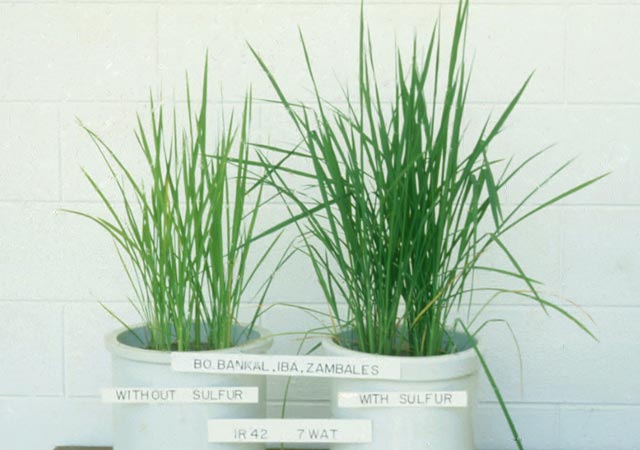Sulfur (S) deficiency
 S-deficient plants are stunted with reduced tillering compared to normal plantsWhat it does
S-deficient plants are stunted with reduced tillering compared to normal plantsWhat it does
Sulfur (S) deficiency affects chlorophyll production, protein synthesis, and plant function and structure.
It can lead to delayed plant development and maturity. If deficiency occurs at vegetative stage, it can affect yield.
Why and where it occurs
S deficiency is not particularly common in irrigated rice.
It occurs in soils containing allophane, soils with low organic matter status, highly weathered soils containing large amounts of Iron (Fe) oxides, and sandy soils.
How to identify
Check the field for the following symptoms:
- yellowing or pale green color of the whole plant
- young leaves are chlorotic or light green colored with the tips becoming necrotic
- lower leaves does not show necrosis
- leaves are paler yellow
Other symptoms and effects on growth include the following:
- reduced plant height and stunted growth (but plants are not as dark-colored as in Phosphorus or Potassium deficiency)
- reduced number of tillers, fewer and shorter panicles, reduced number of spikelets per panicle
- delayed plant development and maturity by 1-2 weeks
- yellowish seedlings in nursery beds with retarded growth
- high seedling mortality after transplanting
S-deficient rice plants have less resistance to adverse conditions (e.g., cold).
S deficiency has the same foliar symptoms as nitrogen deficiency. To confirm cause of problem, send soil and plant sample to laboratory for testing.
Why is it important
S deficiency is not particularly common in irrigated rice and thus tends to be of little economic significance.
Its effect on yield is more pronounced when S deficiency occurs during vegetative growth.
How to manage
There is currently no practical field management option for S deficiency. Where possible,
- Apply S to the seedbed (rice nursery) by using S-containing fertilizers.
- Incorporate straw instead of completely removing or burning it.
- Improve soil management to enhance S uptake by maintaining sufficient percolation (~5mm per day) or by carrying out dry tillage after harvesting.